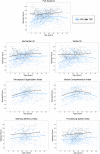Longitudinal Stability of Intellectual Functioning in Autism Spectrum Disorder: From Age 3 Through Mid-adulthood
- PMID: 34677753
- PMCID: PMC9090201
- DOI: 10.1007/s10803-021-05227-x
Longitudinal Stability of Intellectual Functioning in Autism Spectrum Disorder: From Age 3 Through Mid-adulthood
Abstract
Intelligence (IQ) scores are used in educational and vocational planning for individuals with autism spectrum disorder (ASD) yet little is known about the stability of IQ throughout development. We examined longitudinal age-related IQ stability in 119 individuals with ASD (3-36 years of age at first visit) and 128 typically developing controls. Intelligence measures were collected over a 20-year period. In ASD, Full Scale (FSIQ) and Verbal (VIQ) Intelligence started lower in childhood and increased at a greater rate with age relative to the control group. By early adulthood, VIQ and working memory stabilized, whereas nonverbal and perceptual scores continued to change. Our results suggest that in individuals with ASD, IQ estimates may be dynamic in childhood and young adulthood.
Keywords: ASD; Autism spectrum disorder; Cognitive development; Intelligence; Longitudinal study; Stability.
© 2021. The Author(s).
Conflict of interest statement
The authors have no relevant financial or non-financial interests to disclose.
Figures
References
-
- Akaike H. A new look at the statistical model identification. IEEE Transactions on Automatic Control. 1974;19(6):716–723. doi: 10.1109/TAC.1974.1100705. - DOI
-
- American Psychiatric Association . Diagnostic and Statistical Manual of Mental Disorders: DSM-IV. 4. American Psychiatric Association; 1994.
MeSH terms
Grants and funding
LinkOut - more resources
Full Text Sources
Medical




